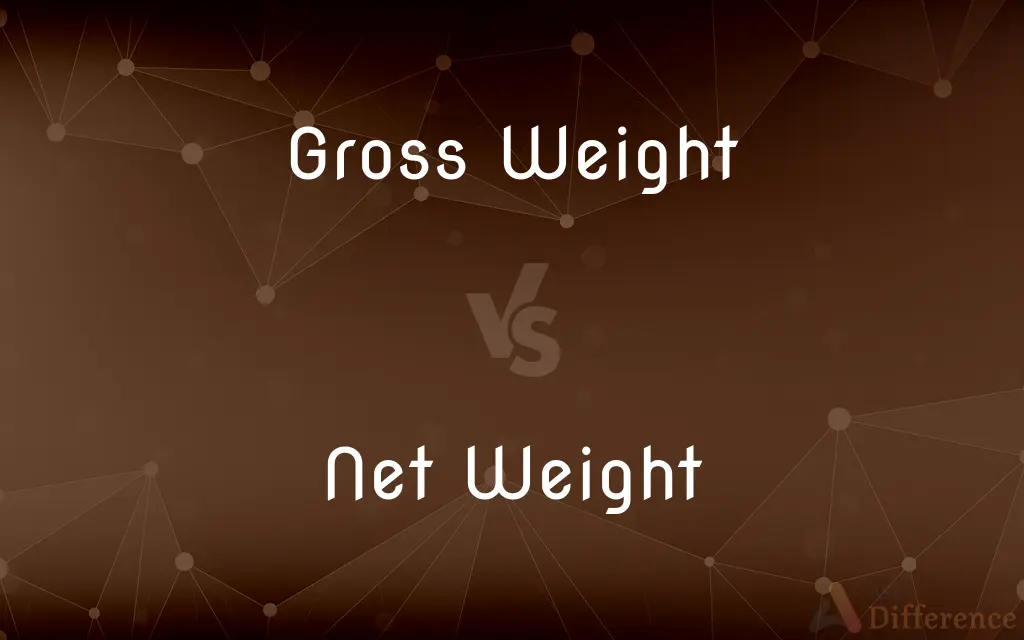Gross Weight vs. Net Weight — What's the Difference?
By Tayyaba Rehman — Published on January 2, 2024
Gross Weight is the total weight including the item and its packaging, while Net Weight is the weight of the item alone.

Difference Between Gross Weight and Net Weight
Table of Contents
ADVERTISEMENT
Key Differences
Gross Weight refers to the total weight of a product and its packaging, encompassing everything that is included during shipping. Conversely, Net Weight signifies the actual weight of the product itself, excluding any packaging or additional materials.
When considering Gross Weight, it's crucial to factor in the weight of containers, wrappings, and other packaging elements. In contrast, Net Weight strictly represents the weight of the contents, providing a more accurate measure of the product's substance.
Gross Weight is often used in transportation and shipping contexts to determine costs and compliance with regulations, as it includes the weight of the product plus its packaging. On the other hand, Net Weight is typically highlighted in retail and consumer contexts, giving customers a clear idea of the quantity of the product they are purchasing.
The distinction between Gross Weight and Net Weight is important for businesses to avoid misleading consumers and to adhere to labeling regulations. Gross Weight might overstate the amount of the actual product, while Net Weight offers transparency and accuracy.
Calculating Net Weight involves subtracting the weight of the packaging from the Gross Weight. This distinction ensures that customers know exactly what they are paying for, focusing solely on the product's weight, while Gross Weight is critical for logistical and shipping considerations.
ADVERTISEMENT
Comparison Chart
Definition
Total weight of product + packaging
Weight of the product alone
Importance in Shipping
Determines shipping costs
Less relevant for shipping
Relevance to Consumers
Less direct relevance
Directly indicates product quantity
Packaging Weight Inclusion
Includes packaging weight
Excludes packaging weight
Regulatory Compliance
Essential for transport laws
Crucial for consumer protection
Compare with Definitions
Gross Weight
Comprehensive weight of an object before subtraction of non-essential components.
The gross weight of the packaged coffee was 1.1 kilograms, packaging included.
Net Weight
True weight of the goods sold, not including external factors.
The net weight of the juice in the bottle was 1 liter.
Gross Weight
Total weight of an item including its container and packaging.
The gross weight of the canned beans was 500 grams, can included.
Net Weight
Essential weight of the product as listed for consumer information.
The net weight of the packed rice was marked as 1 kilogram on the label.
Gross Weight
Combined weight of goods and their immediate wrappings.
The suitcase's gross weight was 23 kilograms, clothes and suitcase combined.
Net Weight
Actual weight of the contents without additional materials.
The net weight of the flour in the bag was 2 kilograms.
Gross Weight
Aggregate weight of a product and its external materials.
The gross weight of the boxed smartphone was 1.2 kilograms.
Net Weight
Pure weight of the item itself, sans container or wrapping.
The net weight of the chocolates, minus the box, was 250 grams.
Gross Weight
Overall weight as measured on scales, inclusive of all elements.
The gross weight of the packed fish was 3 kilograms, ice included.
Net Weight
Weight of a product excluding its packaging.
The net weight of the cereal inside the box was 500 grams.
Common Curiosities
What does Net Weight mean?
It's the weight of the product alone, excluding any packaging.
Why is Gross Weight important in shipping?
It determines shipping costs and ensures compliance with transport regulations.
What is Gross Weight?
It's the total weight of a product plus its packaging and container.
How is Net Weight relevant to consumers?
It indicates the actual quantity of the product they're buying.
Can Gross Weight mislead consumers?
It can overstate the amount of the actual product if not differentiated from Net Weight.
Is packaging weight included in Net Weight?
No, Net Weight strictly refers to the product's weight alone.
Does Gross Weight include the packaging?
Yes, it includes the weight of the product and all its packaging.
Is Net Weight important for regulatory compliance in retail?
Absolutely, it's crucial for consumer protection laws and accurate labeling.
Is Net Weight used for shipping purposes?
It's less relevant for shipping but critical for consumer transparency.
Why is Net Weight important for labels?
It ensures accuracy and transparency for consumers about what they're purchasing.
How do you calculate Net Weight?
By subtracting the weight of the packaging from the Gross Weight.
Does Gross Weight affect transportation laws?
Yes, it's essential for adhering to weight limits and regulations in transportation.
What happens if you only consider Gross Weight in sales?
It can lead to misconceptions about the actual quantity of the product.
How do businesses use Gross Weight?
Mainly for logistical, shipping, and inventory purposes.
Why should consumers pay attention to Net Weight?
To understand the exact quantity of the product they are purchasing, without the packaging.
Share Your Discovery

Previous Comparison
Concert Band vs. Symphonic Band
Next Comparison
Fats vs. OilsAuthor Spotlight
Written by
Tayyaba RehmanTayyaba Rehman is a distinguished writer, currently serving as a primary contributor to askdifference.com. As a researcher in semantics and etymology, Tayyaba's passion for the complexity of languages and their distinctions has found a perfect home on the platform. Tayyaba delves into the intricacies of language, distinguishing between commonly confused words and phrases, thereby providing clarity for readers worldwide.













































